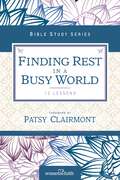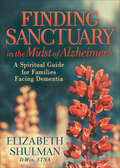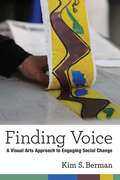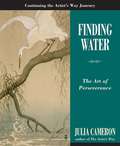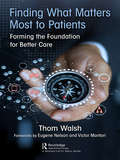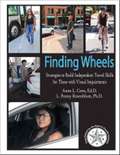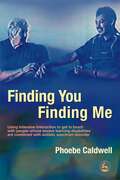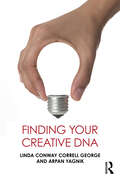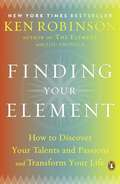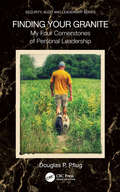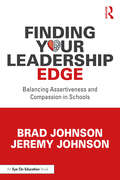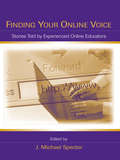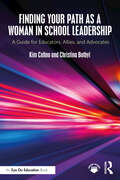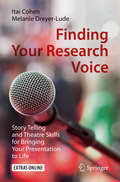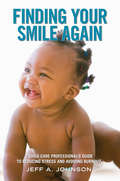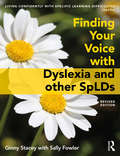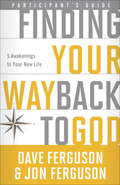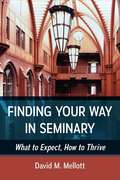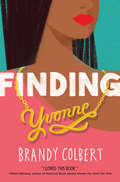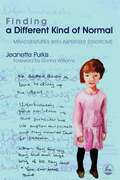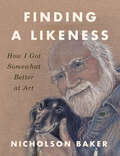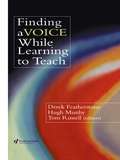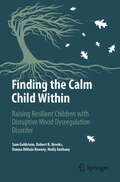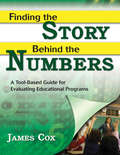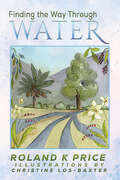- Table View
- List View
Finding Rest in a Busy World: I Need to Slow Down but I Can't! (Women of Faith Study Guide Series)
by Patsy Clairmont Women Of FaithOpportunities in life abound, but if left unchecked our busy schedules can quickly consume us. Doing too much will strip our gears and empty our tanks. As we run hard and fast on the treadmill of life, we will find our souls growing weary, our bodies growing weak, and our spirits running dry. In Finding Rest in a Busy World, you will explore what the Bible has to say about the importance and value of rest. You will learn ways to recognize if your schedule has gotten out of control and how you can apply the brakes to restore healthy boundaries in your life. Even more, you will discover how God promises you can rest in who He is, what He's done for you, and what He will do for you. The Women of Faith® Bible Studies provide intriguing insights into topics that are relevant to women's lives today. Each guide includes twelve weeks of study, down-to-earth illustrations, and reflections to help you move the truth from your head to your heart. A leader's guide for use with small groups is also included.
Finding Sanctuary in the Midst of Alzheimer's: A Spiritual Guide for Families Facing Dementia
by Elizabeth ShulmanFinding Sanctuary in the Midst of Alzheimer’s is currently the only Bible study on the market for dementia caregivers and the communities that serve them.
Finding Voice: A Visual Arts Approach to Engaging Social Change
by Kim S BermanIn Finding Voice, Kim Berman demonstrates how she was able to use visual arts training in disenfranchised communities as a tool for political and social transformation in South Africa. Using her own fieldwork as a case study, Berman shows how hands-on work in the arts with learners of all ages and backgrounds can contribute to economic stability by developing new skills, as well as enhancing public health and gender justice within communities. Berman’s work, and the community artwork her book documents, present the visual arts as a crucial channel for citizens to find their individual voices and to become agents for change in the arenas of human rights and democracy.
Finding Water: The Art of Perseverance
by Julia CameronThe third book in Julia Cameron's groundbreaking The Artist's Way trilogy on creative self-renewal is now in paperback. In this inspiring twelve-week program, the third in Julia Cameron's beloved body of work on the creative process, Cameron offers guidance on weathering the periods in an artist's life when inspiration has run dry. This book provides wisdom and tools for tackling some of the greatest challenges that artists face such as: Making the decision to begin a new project Persevering when a new approach to your art does not bear immediate fruit Staying focused when other parts of your life threaten to distract you form your art Finding possibilities for artistic inspiration in the most unlikely places Another revolutionary twelve-week program for artistic renewal from the foremost authority on the creative process, Finding Water is an essential book for any artist.
Finding What Matters Most to Patients: Forming the Foundation for Better Care
by Thom WalshResearch shows that the importance of patient-reported outcomes, improved decision support, and care coordination is growing rapidly as new payment models transform healthcare delivery. This has led to the use of new measures and communication techniques, including shared decision-making and motivational interviewing. Using patient-reported outcomes at the point of service helps providers identify what matters most to the patient in front of them now. Describing treatment options and deciphering a patient’s preferences effectively is a process, which has been likened to arriving at a diagnosis. Providers make a medical diagnosis by discerning a patient’s primary complaints, past history, exam findings, and test results. A preference diagnosis can be thought of similarly. Providers work with their patients to identify what matters most to them, discuss the risks and benefits of the available treatment options, and support the patient as needed through the decision-making process. Once informed of their options, patients frequently chose treatments that require modifying their habits. Motivational interviewing helps patients and providers understand what matters most now and design care plans that provide appropriate support. While many healthcare providers and leaders may be familiar with patient-reported outcomes from research articles, and have heard of shared decision-making and motivational interviewing, few have experience using them. Fewer still understand how each relates to the other. This book helps leaders and healthcare providers better understand how to use patient-reported data to their advantage at the point of service. The book provides the background for developing shared knowledge and shared language, along with extensive examples of dialogue between providers and patients. In addition, the book contains personal interviews of subject matter experts who have significant experience using these measures. The result is a comprehensive understanding of how these measures and techniques can help providers, organizations, and patients navigate this modern healthcare management opportunity.
Finding Wheels: Strategies to Build Independent Travel Skills for Those With Visual Impairments
by L. Penny Rosenblum Anne Corn Ed.D.Young adults with visual impairments, who are largely the focus of Finding Wheels, have much to figure out about how they will get from place to place as they seek greater independence and autonomy. In the book, the authors have identified and put into very practical terms the many strategies that nondrivers and low vision drivers can employ. Whether it is driving a car with low vision aids, using public transportation, or negotiating a ride with others in a mutually beneficial way, Finding Wheels informs and empowers travelers to take charge of their own transportation strategies. Families and professionals alike will find this update of Finding Wheels to be the definitive resource on helping youth and young adults maximize their independence in meeting their transportation needs.
Finding You Finding Me: Using Intensive Interaction to get in touch with people whose severe learning disabilities are combined with autistic spectrum disorder
by Phoebe CaldwellPhoebe Caldwell's remarkable new book makes accessible for the first time the complex, intricate inner and sensory worlds of people whose learning disabilities are combined with autistic spectrum disorder and, often, difficult-to-manage behaviour. Based on many years of working with such people, many of whom have withdrawn into a world of their own, she explores the different sensory reality they experience, showing it to be infinitely more complex and varied than is widely understood. She introduces a practical approach known as Intensive Interaction, which uses the body language of such people - who have hitherto largely been regarded as unreachable - to get in touch with them, giving them a way of expressing themselves which shifts their attention from solitary self-stimulation to shared activity. The outcome is not only a marked improvement in behaviour and ability to communicate but, more important, many parents will say 'they are just much happier'. Covering not only the practical aspects of introducing this technique, but also the thinking behind it, this landmark book has much to say on behalf of a group that has in the past largely been denied a voice, and will open new avenues for both practice and research. It is invaluable for parents, carers, and all who work with this group.
Finding Your Creative DNA
by Arpan Yagnik Linda Conway Correll GeorgeThis book enables readers to discover their inner creative DNA, by providing a strong dose of the four elements of the Creative Matrix–Interrogation, Information, Interpretation, and Inspiration. Creative Aerobics (CA) generates a personal ideation system that produces creativity on demand (COD) and that arrives at multiple solutions in less than an hour in a relaxing and enjoyable way.The strength of the volume lies in its ability to move readers past the conventional and time-consuming 20th-century ideation. It helps develop an individual, personal approach to their creative DNA by introducing increasingly complex word exercises that strengthen left-brain problem-solving and increase right-brain discoveries. It teaches, encourages, and integrates all aspects of CA to develop the mental muscle that fuels readers’ paths to creative accomplishment. By taking CA step by step, readers develop a comfort level, knowing they will always be able to come up with ideas.This book will be useful to students, young professionals, and senior leaders looking for the inside track to their creativity. It will also be an invaluable daily practice and interesting read for all students taking general education courses, especially those opting for integrative learning courses which are becoming more prevalent across universities worldwide.
Finding Your Element
by Ken RobinsonFrom one of the world's leading thinkers and speakers on creativity and self-fulfillment, a breakthrough book about talent, passion, and achievement The element is the point at which natural talent meets personal passion. When people arrive at the element, they feel most themselves and most inspired and achieve at their highest levels. The Element draws on the stories of a wide range of people, from ex-Beatle Paul McCartney to Matt Groening, creator of The Simpsons; from Meg Ryan to Gillian Lynne, who choreographed the Broadway productions of Cats and The Phantom of the Opera; and from writer Arianna Huffington to renowned physicist Richard Feynman and others, including business leaders and athletes. It explores the components of this new paradigm: The diversity of intelligence, the power of imagination and creativity, and the importance of commitment to our own capabilities. With a wry sense of humor, Ken Robinson looks at the conditions that enable us to find ourselves in the element and those that stifle that possibility. He shows that age and occupation are no barrier, and that once we have found our path we can help others to do so as well. The Element shows the vital need to enhance creativity and innovation by thinking differently about human resources and imagination. It is also an essential strategy for transforming education, business, and communities to meet the challenges of living and succeeding in the twenty-first century. .
Finding Your Granite: My Four Cornerstones of Personal Leadership (Security, Audit and Leadership Series)
by Douglas P. PflugIn "Finding your Granite", Executive Leadership Coach and Mentor Douglas Pflug walks you through some of the life experiences, lessons and key take-ways from his years as a dual sport university athlete, 28 years as a police officer, 30 years as an elite strength and conditioning coach, mentor and leader. Douglas accomplishes this through four very dynamic, energetic and heartfelt sections entitled: "The Struggle" "Dash Leadership" "Four Cornerstones of Personal Leadership" and "Rise Up and Excel". The Author’s mentoring and protégé process and implementation of #RiseUpAndExcel and #StrongerFasterFitter methodologies assists people in discovering "who they were, who they are and whom they want to be" moving forward in this post COVID 19 world. This book was written through the eyes of an "everyday guy" and designed to educate, entertain and inspire front line 911 emergency workers to seek and achieve their potential. Additionally, this book will also be an essential resource for individuals and business leaders who wish to stay ahead of the evolving leadership trends of strategic thinking, inspiration and motivation, strong interpersonal skills, vision, decisiveness and passion.
Finding Your Leadership Edge: Balancing Assertiveness and Compassion in Schools
by Jeremy Johnson Brad JohnsonAs a school leader, do you ever have trouble striking a balance between being agreeable and pleasing your staff, while also being assertive and making the hard decisions? In this empowering new book from Brad Johnson and Jeremy Johnson, you’ll discover the tools and insights you need to fine-tune your leadership style and maximize your effectiveness while still building a great culture. You’ll learn how to find the balance between assertiveness and compassion that’s right for you, allowing you to address challenges with confidence and empathy. You’ll also explore the art of emotional intelligence and its role in building a harmonious school culture, where staff and students thrive. Each chapter is filled with practical strategies and examples to help you build your skills. As you find your edge as a leader, you’ll improve your results for the school and your relationships with staff, and you’ll feel more fulfilled in your personal journey as well!
Finding Your Online Voice: Stories Told by Experienced Online Educators
by J. Michael SpectorFinding Your Online Voice offers a thought-provoking discussion of innovative approaches to technology-based distance education. Editor J. Michael Spector focuses on how highly experienced teachers conceptualize and organize online classes. Best practices and guidelines for effective online teaching as well as a set of instructor skills speci
Finding Your Path as a Woman in School Leadership: A Guide for Educators, Allies, and Advocates
by Kim Cofino Christina BotbylFeaturing the experiences of over 70 successful female leaders in international, public, and private schools around the world, Finding Your Path as a Woman in School Leadership brings together interconnected stories about the realities of being a woman in K–12 school leadership today. Women face distinct and unique challenges in pursuing a leadership pathway in schools; unfortunately, most of the obstacles facing women are hidden and only become visible when encountered on the journey to leadership. This book uncovers these invisible obstacles and shares the personal journeys of real women who have overcome them. Chapters feature powerful stories woven together to provide takeaway strategies and address common themes for women in leadership, including unconscious bias and daily microaggressions; physical, linguistic, and cultural expectations of leaders; perception (or reality) of lack of opportunities for women; impostor syndrome and double standards; and availability of mentorship and guidance. This impactful book provides actionable steps for both aspiring leaders and established leaders ready to support growing leaders in their school communities.
Finding Your Research Voice: Story Telling and Theatre Skills for Bringing Your Presentation to Life
by Melanie Dreyer-Lude Itai CohenLearning to tell a compelling research story can have a significant impact on your career. It can make you stand out at professional conferences, on the job market, or during an ideal networking opportunity. It is easy to tell a research story badly. It takes time and effort to learn to tell a research story well. This compact and engaging volume presents a series of techniques followed by theatre-inspired, field tested exercises that will help you improve your research presentations. Once you’ve learned how to create a dynamic live performance of your research story, you may find that this professional obligation is no longer something to dread, and may even become a highlight of your research experience.
Finding Your Smile Again
by Jeff A. JohnsonUsing warmth and humor, this book offers techniques for dealing with the everyday stress of being a childcare professional. Written by a caregiver who's been there, it describes the symptoms and causes of burnout, with advice to get through each challenge.
Finding Your Voice with Dyslexia and other SpLDs
by Ginny Stacey Sally FowlerFinding Your Voice with Dyslexia and other SpLDs is an essential guide to living with dyslexia and other specific learning difficulties (SpLDs). The book provides readers with a practical guide to expressing and developing ideas and feelings. Uniquely designed for dyslexic/ SpLD readers, this book discusses how individual people function and will help readers to: •understand how they think•know what they can do to maintain clear thinking•know how they can positively contribute to any situation in which they find themselves.When people with SpLD find their voice, they gain the self-esteem and confidence to tackle all elements of life (study, employment, general living) and to negotiate sucessfully with those around them. The book contains stories, insights, examples, tips and exercises, presented in a user-friendly way throughout. The book has also been designed for non-linear reading and each chapter includes a ‘dipping-in’ section to guide the reader. The book does not have to be read as solid, continuous text from start to finish: it can be read more like a travel guide.As well as providing vital assistance to people with dyslexia and other specific learning difficulties, this book will benefit anyone supporting, living or working with dyslexic/ SpLD people by helping them to understand more about the dyslexic/ SpLD world.
Finding Your Way Back to God Participant's Guide
by Dave Ferguson Jon FergusonTake the Next Step Perfect for individual or group studyThe companion Participant's Guide explores the idea that we all want to find our way home - and back to God. The participant's guide offers Bible investigation, life application questions, and prayer exercises help you take positive action on your desire to find God.
Finding Your Way in Seminary: What to Expect, How to Thrive
by David M. Mellott<p>Those considering seminary, those in seminary, and those preparing to graduate from seminary need help. They need help discerning their call, moving into the bewildering world of theological study, and balancing the competing claims of school, work, and family. This book proposes to offer that help, and more, because the seminary experience is evolving more rapidly than at any time in its history. <p>This book is an ideal textbook for introductory seminary or spiritual formation courses that the majority of seminaries now require of first-year students. The three sections of this book provide information and guidance to those who are discerning a call to ministry and considering theological education; introduces new seminarians to thinking theologically, forming supportive relationships, integrating what they are learning in school with their spiritual lives, and practical guidance on such matters is serving a local congregation while one is in seminary; and offers advice on negotiating the ordination process in different denominational traditions and making the transition from study to full-time ministry.</p>
Finding Yvonne
by Brandy ColbertFor fans of Nicola Yoon and Nina LaCour comes a striking novel about difficult choices from acclaimed author Brandy Colbert.Since she was seven years old, Yvonne has had her trusted violin to keep her company, especially in those lonely days after her mother walked out on their family. But with graduation just around the corner, she is forced to face the hard truth that she just might not be good enough to attend a conservatory after high school.Full of doubt about her future, and increasingly frustrated by her strained relationship with her successful but emotionally closed-off father, Yvonne meets a street musician and fellow violinist who understands her struggle. He's mysterious, charming, and different from Warren, the familiar and reliable boy who has her heart. But when Yvonne becomes unexpectedly pregnant, she has to make the most difficult decision yet about her future.From the author of Pointe and Little & Lion, comes another heartfelt novel about the twists and turns that can show up on a path meant only for you.
Finding a Different Kind of Normal: Misadventures with Asperger Syndrome
by Donna Williams Jeanette PurkisJeanette Purkis spent her early life reacting violently against her feelings of embarrassment, anger and confusion about her 'difference' from other people. She was unaware until well into adulthood that everything she found difficult, including her lack of success in forming relationships, could be a result of having Asperger Syndrome. Used to being a misfit from a very young age, Jeanette found that being a member of a group in which she had a label - Jeanette the Communist; Jeanette, Enemy of the State; Jeanette the convict; Jeanette the drug addict - gave her a sense of order she could depend on, particularly in prison, where each day had a set routine and the inmates accepted her because of her rebel attitude. Finally diagnosed with Asperger Syndrome at the age of 20, the author only began to accept her diagnosis some years later when she felt for the first time that she might learn to cope with being herself. Jeanette's remarkable life and her journey towards finding a different kind of normal is compelling and inspiring reading for people with autism spectrum disorders, and those living or working with them.
Finding a Likeness: How I Got Somewhat Better at Art
by Nicholson BakerNamed a Most Anticipated Book of 2024 by Literary HubFrom the acclaimed and bestselling writer Nicholson Baker, a deeply personal account of his journey learning how to paint for the first time, and a meditation on the power of art in times of crisisNicholson Baker wanted to learn how to paint.In 2019, after years of researching and writing about secret and often horrible government programs for his book Baseless: My Search for Secrets in the Ruins of the Freedom of Information Act, he was wiped out. Having been steeped for so long in the history of war, violence, and conspiracy, the world had lost some of its brightness. Photography had scratched a creative itch for years, but now, Baker was desperate to squeeze more out of what he saw – he wanted to live, slowly, through the snatches of life he was recording in photos. Maybe, he thought, he could learn to paint? The idea consumed him, but he was nagged by an even more debilitating doubt: What if he failed?Finding a Likeness is Baker&’s record of the years he worked to improve his artistic skills, beginning with his first, humble attempts to set paintbrush to paper. Driven by a natural curiosity and a strong desire to paint faces, clouds, and landscapes that actually resemble faces, clouds, and landscapes, he attends classes from local artists, watches YouTube tutorials, and seeks out master painters from the past and present in the hopes of uncovering their secrets. In his inimitable voice, Baker recounts the highs and lows of the creative process, reflects on memories of growing up as the son of two painters, and learns what it means to really see.Filled with Baker&’s own art, as well as the work of artists from around the world, Finding a Likeness is a tender and deeply felt testimony to taking a step back and going back to basics. Baker improves dramatically in his craft, but as he considers what it means to try, fail, and try again, he discovers far more than what it takes to paint a cloud – rather, he shows us how to bear witness to the world, to the good and the bad, and to do it all justice with paper and ink.
Finding a Voice While Learning to Teach: Others' Voices Can Help You Find Your Own
by Tom Russell Derek Featherstone Hugh MunbyFirst published in 1997. Routledge is an imprint of Taylor & Francis, an informa company.
Finding the Calm Child Within: Raising Resilient Children with Disruptive Mood Dysregulation Disorder (Copernicus Books)
by Sam Goldstein Robert B. Brooks Donna DiMaio Rooney Molly AnthonyIn the intricate landscape of childhood emotional and behavioral challenges, disruptive mood dysregulation disorder (DMDD) stands as one of the most daunting. Characterized by intense irritability and explosive outbursts, DMDD can transform the journey of parenting and teaching into a relentless storm, leaving families and educators searching for guidance and support. This book offers a beacon of hope as well as a comprehensive resource crafted for those dedicated to nurturing children with DMDD. Key areas of coverage include: · Biological, psychological, and environmental factors contributing to DMDD and how to recognize and assess its symptoms effectively. · Evidence-based approaches to assessing and treating DMDD, from parent training and therapeutic interventions to medication management. · The eight guideposts for building resilience to help children with DMDD navigate their emotions, develop problem-solving skills, and cultivate self-discipline and empathy. · Real-life inspirational and practical wisdom from the experiences of families who have courageously and lovingly faced the challenges of DMDD. <span style="font-size: 11.0pt;
Finding the Story Behind the Numbers: A Tool-Based Guide for Evaluating Educational Programs
by James B. CoxLearn to define a quality program, analyze what is and is not working, and avoid "test score fatigue" with a user-friendly, three-part framework for school improvement.
Finding the Way Through Water: On Becoming Waterwise With The Bible
by Roland K PriceFinding the Way Through Water explores how water contributes to our understanding of the created world and our Christian beliefs. As an emeritus professor and an ordained priest in the Church of England, Roland K Price explores how water features in the Bible. Important at creation, water brings about global catastrophe, enables escape from slavery, ensures survival in the wilderness, prepares people for worship, and sustains warriors and exiles. Jesus turns water into wine, walks on water, stills the storm, has his feet washed with a woman’s tears, and washes his own disciples’ feet.You will be surprised by the extent to which water pervades God’s story in the Bible, and how an understanding of the management of water today can make this story available to all. Prepare to be challenged whether you are a water professional or a Christian wanting to know more about God’s world today.
